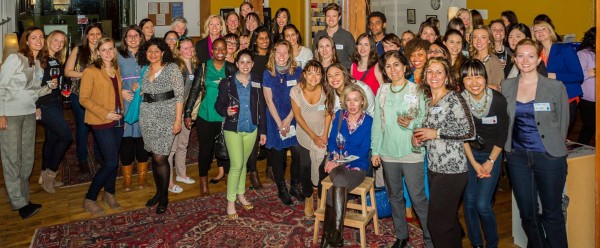
Standard Interviews is a daily series that showcases the creative individuals that are trying to make Toronto a better place to live.
Vicki Saunders wants to change the world.
And for almost 25 years, she’s been doing exactly that. As the founder SheEO and a mentor to countless young women, Saunders has spent most of her adult life trying to empower other women. The Toronto Standard spoke to her ahead of SheEO’s Purple Carpet Preview at the Berkeley Church. Here, we talk to her about how she got started as an entrepreneur, the fallacy of leaning in and the true meaning of success.
Tell us briefly about yourself and your work.
I’m a serial entrepreneur that has operated a number of different startups and businesses. I’ve also mentored over a thousand young people over the past 15 years.
One of the things I’ve noticed through mentoring is that young women—well, women in general—ask different questions than men do. At first, I ignored that for a long time (laughs), and then I decided to do something about it.
A decade ago I was the co-founder of The Energy Group, the first public incubator in Canada. Now that we’re coming full circle—with incubators and accelerators all the rage again—I’ve noticed that incredibly talented young women keep entering into accelerators that ask them to play by someone else’s rules. They’re told the rules that govern an early stage startup—what you need to get funded, for instance—but often times those rules don’t work as well for women as they do for men.
The questions I often get asked by women are how I built my network, how I built up my confidence to deal with the fear of starting something new, and how I manage my work-life balance.
These are thing men never ask me about, though I know they have these questions, too.
We blow those off, calling them“soft skills”, but I think being able to manage those kind of things are some of the most important skills you can bring to a job.
The 20th century was all about dozens of companies with millions of customers; now, we’re moving towards an economy where there will be millions of companies, each with dozens of customers. You have 4-billion people online and you only need several thousand to a million customers to be successful. That’s not a lot when you consider the amount of people with an Internet connection.
This gives entrepreneurs permission to be different, and, I can safely say, that, more than ever, being different is crucial.
All those things combined led me to believe that there is a huge opportunity to change things. That’s where SheEO comes in.
When we launched the program last summer, we had ten companies come in, and ten female angels support it with $5,000 cheques each. At the end of the program, the cohort was asked to determine how the program’s capital would be distributed. They were given two restrictions: they couldn’t give all the money to one venture, and they couldn’t divide it equally between all the ventures.
We’ve done two of these programs so far, and the big thing we focus on is telling our entrepreneurs that they should lead on their own terms, and that they need to be clear on what it is they want to accomplish in the world.
The other part of the program is that we’ve opened up our network to the next generation of female entrepreneurs—in the past, I think it’s fair to say that we haven’t had the strongest networks of women supporting other women.
After our first cohort, I wrote a book called Think Like a SheEO: Succeeding in the Age of Creators, Makers and Entrepreneurs. The book highlights eight principles—the same ones that make up the core of our program.
Although a lot of the book aims to help women, there are things in it that can help anyone.
Part of the reason for that is that we’re transitioning to a new economy where everybody is going to be a creator, maker or entrepreneur, and that’s what the book is focused on.
One of the questions we see get asked a lot is who is the next Mark Zuckerberg going to be. That is, we keep talking about heroes because that’s the world we’re currently living in, but we’re moving towards a post-hero world where the greatest challenges will require multiple people collaborating to solve.
When did you take that first step toward becoming an entrepreneur? When you started I imagine that even fewer women were pursuing careers in entrepreneurship.
Definitely, it was not a cool thing to do back then.
I’ve always been searching for ways to have the biggest impact. When I was younger, I looked around at different careers and couldn’t find one where I could see myself doing it for the rest of my life.
At one point I was lucky to find myself in Europe when the Berlin Wall came down. I got on the train to Prague and stayed there for four years, and that’s when I became an entrepreneur.
Every person I met there was dreaming about what they were going to do now that they were free. For me, the answer to that question was to start a business, then another one, and then to get all my friends to start their own businesses.
Being an entrepreneur spoke to my creative energy and felt like I had a say in the future. I started small and then worked my way up to things that were bigger. In the process, I developed my confidence and network.
I doubt I would have become an entrepreneur had I stayed in Canada; I wasn’t surrounded by people who would have thought it was cool.
That said, you did eventually come back to Canada and start several businesses here. What made you decide to come back?
In Prague, I was at a party one night and a person came up to me and asked, “Why are you doing all of this here rather than in your own country?”
That got me thinking about how I would could create an environment like the one I found in Prague but in a country that was already supposed to be free.
Whatever society you live in, over time expectations start to creep in—you have to go to the right school, you have to have the right friends, you have to have the right job. All those things start to layer on top of one another, but I was lucky, because in Prague all those were washed off.
So I asked myself, “How do you create an environment in Canada where anything is possible?”
I don’t think we’re there yet, and so for me that has been one of the questions I’ve devoted my life to. No matter where you are in the world, you have to surround yourself with people that are dreaming about what is possible and coming up with big ideas to make their dreams a reality. In part, that’s what SheEO is all about.
Part of the premise of your book is that traits that are traditionally thought of as feminine are exactly the ones that entrepreneurs need. Can you elaborate on that?
It’s very rare that I see a woman want to create another me-too app; instead, women often want to create things that will have an impact on the world. We’re at this perfect time: if you have an idea that is about fixing something, or changing something in the world for the better, then there will be a lineup of people to use that product. With a million apps in the App Store, users want something that is going to capture their hearts; it can’t be something that’s simply cool.
Women perceive things more holistically, and we really need business that bring new mindsets, models and solutions for a better world. I think people are craving that, and women generally gravitate to those kind of businesses.
The press release your publicist sent me said that you think we’re past the point where women should”lean in”. Can you talk a bit about that?
I don’t come from a corporate background, so in a lot of ways that colours my perception of Sheryl’s book.
That said, the last thing I would ever encourage anyone to do is to “lean in” to something that wasn’t working for them. If a company’s culture doesn’t work for you, then I don’t think simply trying harder will make things better.
It’s important to trust your instincts.
I think what Sheryl has done is phenomenal, but I think I appeal to the creator, maker, entrepreneur types that aren’t joining corporations, and what those type of people need to do is figure out what they love to do.
For those people, I think you need to find out what you can do all day long, and what problem in the world do you want to fix.
Want to tell us about the event you’re hosting on Monday evening?
Next Monday (today), we’re hosting a Purple Carpet Preview at the Berkeley Church. We’ll be bringing 80 female entrepreneurs from Toronto, as well as advisers and angel investors. These are men and women who are interested in dramatically changing how we support female-led ventures.
We’re also going to be honouring six women that have come before us.
Finally, we’re also going to have networking concierges. They will be there to make sure that everybody is getting connected; it’s all about creating a network to support creating a better world.
Anything to add?
Yeah, I’d like to add that we have a view of success that sees it as something that has to be big. I think that small is the new big. Big companies are trying to figure out how to be smaller, how to be more involved and how to be more flexible, and the mix of the of the two is really important.
We have an opportunity to redefine what success means, especially in a networked world where a bunch of small things can add up to create dramatic change.
If we start to look at success differently, then we will start to recognize that there are many more opportunities for people to have an impact on the world.
____
Igor Bonifacic is a writer working for the Toronto Standard. You can follow him on Twitter @igorbonifacic.
For more, follow us on Twitter @TorontoStandard and subscribe to our newsletter.















